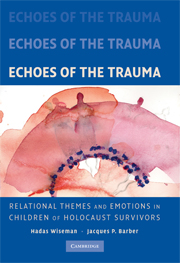Book contents
- Frontmatter
- Contents
- Foreword by Dan Bar-On
- Preface
- Acknowledgments
- 1 Introduction – A Narrative Approach to Bridging the Gap between Clinical Case Studies and Empirical Research on Children of Holocaust Survivors
- 2 Studying Relationship Narratives with the Core Conflictual Relationship Theme Method
- PART ONE RELATIONAL THEMES IN THE NARRATIVES
- PART TWO EMOTIONS IN THE NARRATIVES
- PART THREE HEALING TRAUMA IN THE CHAIN OF THE GENERATIONS
- 11 The Second Generation's Experience of Parenting Their Adolescent Children
- 12 Growing Up to the Music of Knowing–Not Knowing: Reflections and Clinical Implications
- Appendix
- References
- Index
12 - Growing Up to the Music of Knowing–Not Knowing: Reflections and Clinical Implications
Published online by Cambridge University Press: 29 July 2009
- Frontmatter
- Contents
- Foreword by Dan Bar-On
- Preface
- Acknowledgments
- 1 Introduction – A Narrative Approach to Bridging the Gap between Clinical Case Studies and Empirical Research on Children of Holocaust Survivors
- 2 Studying Relationship Narratives with the Core Conflictual Relationship Theme Method
- PART ONE RELATIONAL THEMES IN THE NARRATIVES
- PART TWO EMOTIONS IN THE NARRATIVES
- PART THREE HEALING TRAUMA IN THE CHAIN OF THE GENERATIONS
- 11 The Second Generation's Experience of Parenting Their Adolescent Children
- 12 Growing Up to the Music of Knowing–Not Knowing: Reflections and Clinical Implications
- Appendix
- References
- Index
Summary
The study of the long-term intergenerational effects of the Holocaust on the offspring of the survivors has been addressed in the clinical and research literature for the last three decades. Much of the debated research has focused on the issue of the prevalence of psychopathology in adult children of survivors. In the more recent terminology of the trauma-related literature the issue of intergenerational effects is considered with respect to “secondary traumatization” in survivors' children and “tertiary traumatization” in the grandchildren. The most recent meta-analyses of studies have shown no evidence of either secondary traumatization in nonclinical samples in the children of survivors (van IJzendoorn, Bakermans-Kranenburg, & Sagi-Schwartz, 2003), or tertiary traumatization in the grandchildren (Sagi-Schwartz, van IJzendoorn, & Bakermans-Kranenburg, in press). These findings were based on sophisticated meta-analytic methodology that summarizes a large number of quantitative studies. These meta-analytic summaries do not, however, include studies that rest upon qualitative-narrative methodology, which are also needed to address such a complex phenomenon as intergenerational effects of trauma (Bar-On, 1995; Bar-On, Eland, Kleber, Krell, Moore, Sagi, Soriano, Suedfeld, van der Velden, & van IJzendoorn, 1998; Chaitin, 2003; Rosenthal, 1998). Our study, thus, relies on a unique combination of an adaptation of the Core Conflictual Relationship Theme (CCRT) method and narrative-qualitative methodology as ways to listen to the echoes of the parents' trauma in the relational stories told by nonclinical adult children of the survivors.
- Type
- Chapter
- Information
- Echoes of the TraumaRelational Themes and Emotions in Children of Holocaust Survivors, pp. 230 - 248Publisher: Cambridge University PressPrint publication year: 2008



